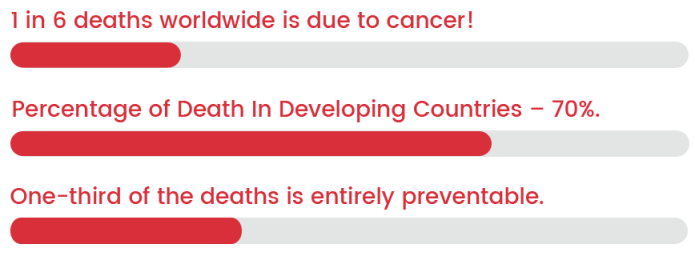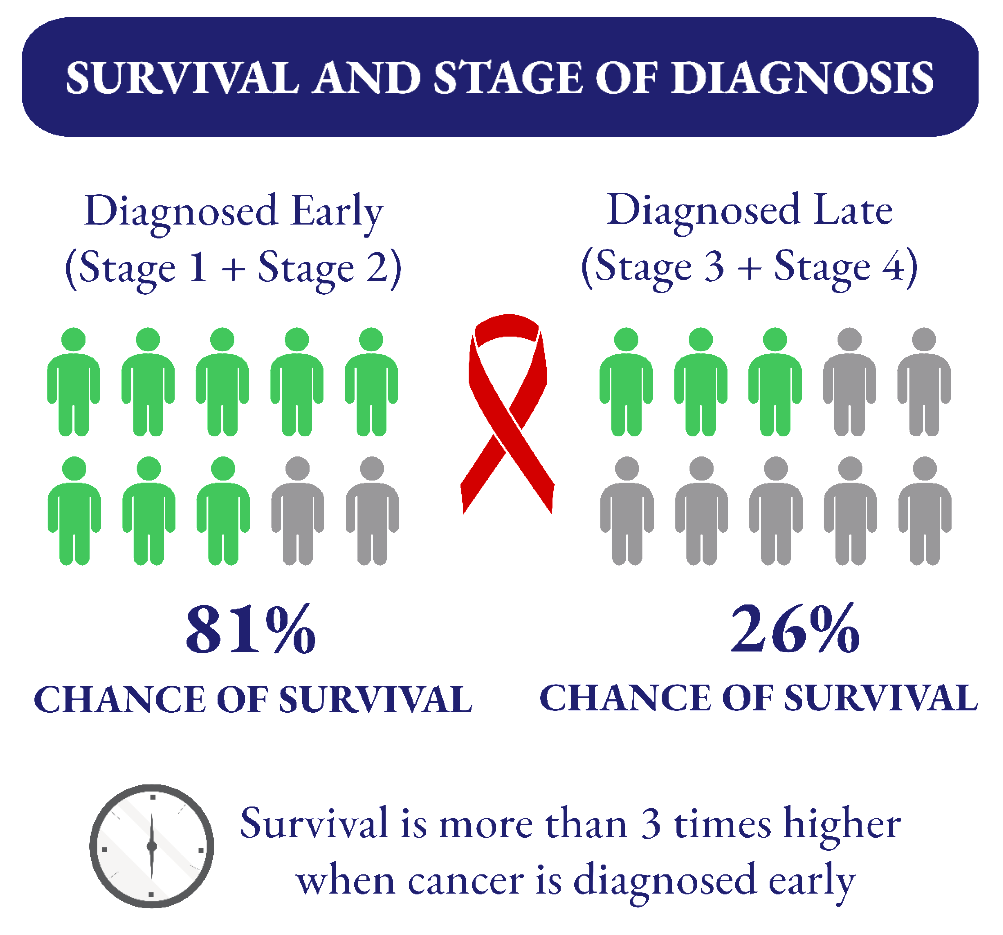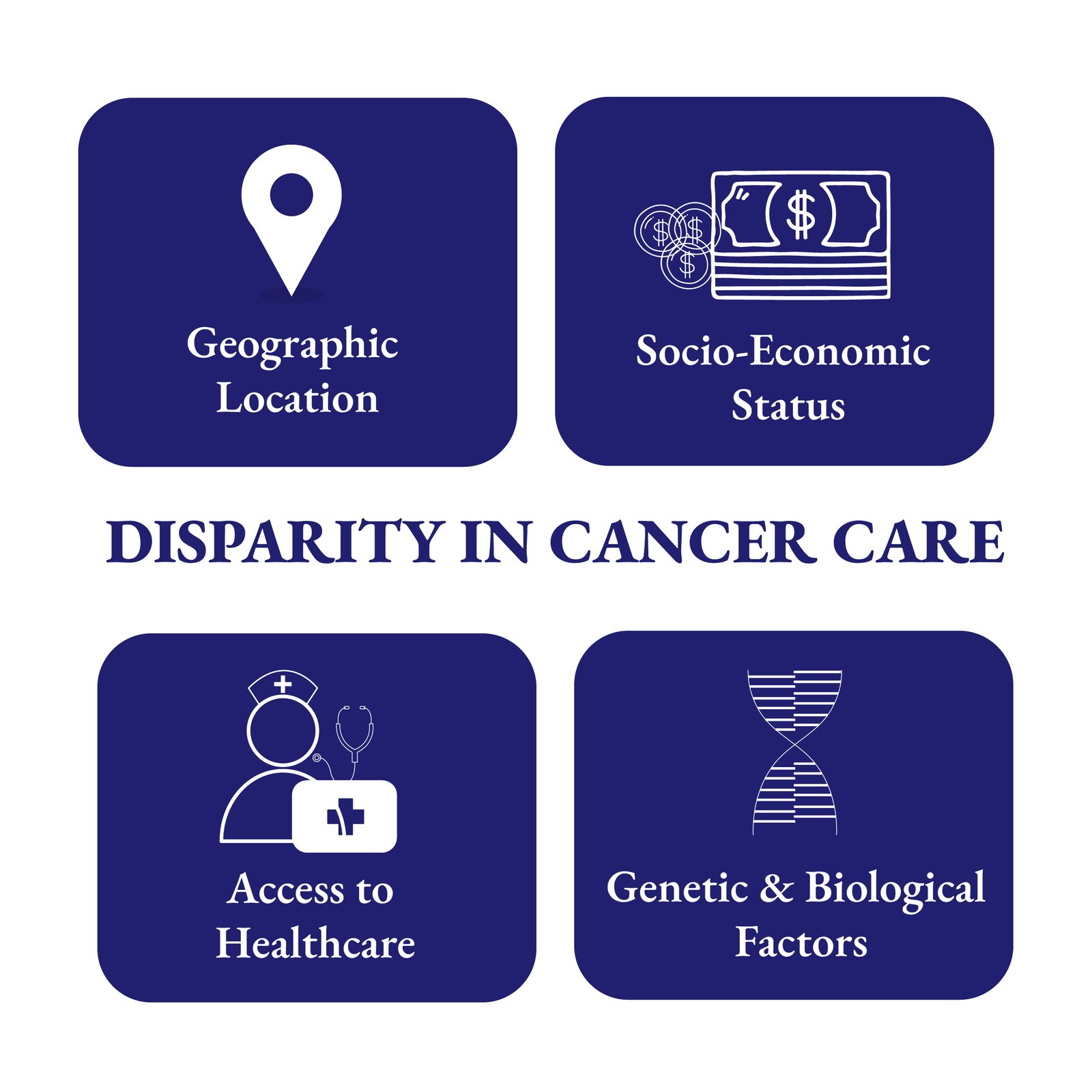Cancer has been declared by the World Health Organization as the leading cause of global morbidity. Low- to middle-income countries are bearing the brunt of that burden, with more than 70 per cent of cancer deaths happen in developing countries. The most glaring area of inequality is seen in the field of childhood cancer, where the survival rates over 80 per cent in high-income countries while as low as 20 per cent in low-income countries.


The disparity in care is one of the growing concerns in the field of cancer care. This disparity arises from four main factors, viz. geographic factors, access to healthcare, socioeconomic status, and biological/genetic factors.
47% of literature studies in the research have shown that cancer (in this particular study it was breast cancer) diagnosis was delayed when the patients were residing in geographically remote or rural areas. 28% of these studies observed that higher proportions of women were diagnosed with cancer in an urban setting than in a rural setting. The diagnosis was delayed by six months in patients located in rural locations and for women living far away from specialised care centres.
In cancer, survival is very closely linked to the stage at diagnosis. In other words, early diagnosis leads to longer survival and improve the quality of life. Studies have observed continuously that as much as two-thirds of the delay in diagnosis was due to patient factors such as symptoms not being considered serious enough(56%), traditional therapy not being good enough(12%), and fear of cancer diagnosis and or treatment(12%).
How can we bridge the divide between the rural and the urban population as we witness an ever-increasing shortage in trained healthcare professionals in the face of a growing demand for healthcare services, especially cancer services? Clinical artificial intelligence holds the key to this problem and has the potential to change the cancer diagnosis process drastically.
We carried out a survey in Kenya to unveil more on the ground realities of access to healthcare. We were startled to find that almost two-thirds of the population in studied area in Kenya have access to mobile phone; however only less than ten per cent have got access to quality healthcare.

Cost is a major consideration, and therefore we have to keep the cost factor and affordability in mind while carrying out any field trial. Out of all the options that are available to us to bridge this gap, the most readily available and easily implementable is mobile health. Given the widespread access and reducing price of a mobile phone, mobile healthcare can be a powerful, modern and yet affordable way to bridge the disparity in the healthcare standards.
We created a mobile application and carried out a field trial amongst the inhabitants of Kenya. This trial was aimed to find out community’s adoption of new technology and to calculate its potential impact in the underserved part of the world.
Please see the video.

Cancer care is improving but care plans are still lagging.
The results of the 2019 National Cancer Patient Experience Survey, published in June 2020 suggest that the vast majority of people living with and beyond cancer rated their overall NHS care highly but also revealed that tens of thousands were still not receiving...

The alarming doctor exodus.
Doctors go to work every day simply wanting to help people. But being a doctor is far from easy in today’s world. The busy and complex environment of the UK healthcare system is slowly eroding the quality of patient care. The increasingly litigious minefields and...

How AI will Humanise the Medical Consultation of the Future.
We can probably all relate an example of a medical consultation where the clinician was in a hurry and we felt rushed and uncertain as to whether they had taken into account all our symptoms, situation, concerns. A situation as frustrating for the clinician as the...

India’s Leadership in Global Cancer Research Initiatives
India is already witnessing significant changes in healthcare delivery and electronic patient record management. Fast changes are taking place in private as well as government sector. Even though there is a lot of scope for improvement, the role of an emerging India...

A Thriving Team YouDiagnose
“If you want to go fast, go alone. If you want to go far, go together.” - African Proverb Founders Dr. Aswini Misro – Founder and Lead – Domain Expert – Clinical Artificial Intelligence & Clinical Machine Learning. Dr. Sandeep Gambhir – Co-Founder – Healthcare...

Red Flag Symptoms – The Ticking Timebomb
A red flag symptom is like the built-in siren of the body. Just as an emergency alarm indicates the need for an action plan for a house on fire, such as an emergency evacuation procedure for the occupant of the house - one cannot similarly live in self-denial or...

Devastating impact of delayed cancer diagnosis – Lessons from a true story.
The delayed diagnosis can disastrous in terms of survival and quality of life; The heart-rending story of Beth speaks everything for itself. Over the past decade, cancer mortality rates have decreased dramatically across the board, as the one-year, five-year and...

Can NHS be the ‘GOOGLE’ in Clinical Artificial Intelligence?
Watford, Hertfordshire – We are pleased to inform you that there was a conference of London Artificial Intelligence Group on clinical artificial intelligence at Watford, Hertfordshire on the 19th May 2019. About 60 delegates from seven countries participated in the...

Medical Malpractice – How to Keep Yourself Out of Trouble? Book Release Function – March 2019, London.
The delayed diagnosis can disastrous in terms of survival and quality of life; The heart-rending story of Beth speaks everything for itself. I was humbled by a magnanimous and attentive audience of more than 100 people who cheered during the book release function...